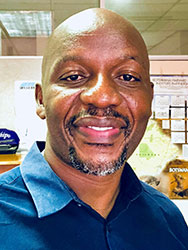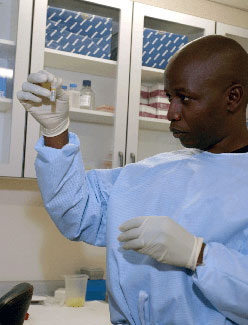Building AIDS research capacity in Botswana: Q and A with Dr. Simani Gaseitsiwe
September / October 2019 | Volume 18, Number 5

Simani Gaseitsiwe, Ph.D.
Dr. Simani Gaseitsiwe began his research career nearly 20 years ago at the height of Botswana’s AIDS epidemic. He took a job as a lab assistant for the
Botswana Harvard Partnership (BHP), a research and training collaboration between the government and Harvard University, led by pioneering Harvard AIDS researcher and longtime NIH and Fogarty grantee, Dr. Myron “Max” Essex. Today, Gaseitsiwe directs BHP’s laboratory in Botswana, trains young scientists and is among the accomplished researchers contributing to the NIH-funded
Human Heredity and Health in Africa (H3Africa) project.
What Fogarty training did you receive?
Professor Max Essex has been my mentor throughout my career. When he started the lab in Botswana in 2000, I was recruited, having just completed my undergraduate degree. In the beginning, the lab was focused on very basic HIV clinical laboratory work, doing CD4 counts to check disease progression, viral loads and patient monitoring. At the time, the epidemic was really bad because that was before the advent of antiretroviral therapy in places like Botswana.
After a year, I had the opportunity with Fogarty support to go to Max’s lab in Boston to do more advanced molecular biology training, to do genotyping or sequencing the HIV strains that are circulating in Botswana. It was more hands-on training, which was very important at the time because we didn’t have the capacity to do that kind of work here. It was a very cosmopolitan environment in Boston, with scientists from all over working together. Coming from my country, where there was basically no one doing HIV research, to train in such a prestigious institution like Harvard was very inspirational and motivated me to pursue further studies including a Ph.D.
How has your career progressed?

An HIV research lab in Botswana has expanded
to offer advanced training to regional and
international students with support from Fogarty.
I have gone from being one of three lab assistants in a new operation capable of only doing basic HIV clinical lab work, to now being the director of 50 staff and a sophisticated, three-story facility with an expanded clinical laboratory, a million-sample repository, a research lab, sequencing facility and training space. Today, we have a number of students who are training at master’s, Ph.D. and postdoctoral levels, and we attract students not only from the region but also internationally. From the humble beginnings to now, it’s been really great to watch the lab develop over the past 18 years.
What research topics are you studying?
I’ve spent a lot of time trying to diversify the research agenda of BHP because most of the focus had been on HIV, but the situation is not as bad as it used to be. I’ve diversified the research portfolio to include viral hepatitis, which is under-researched in Botswana although it is highly prevalent here and in other sub- Saharan Africa countries. We’ve had a few projects looking at the TB incidence in patients who are on antiretroviral therapy because TB co-infection in HIV-infected individuals is the main type of TB in Botswana. Almost 60-70% of the TB patients are also HIV-infected, so I think there is a need to study the two infections together. The research that’s happening here is a byproduct of my Fogarty training. So, you can multiply that by a factor of 10 or 20 because that’s how many of us have had the opportunity for substantial training.
Why is local research capacity important?
It’s something I’ve always had a passion for, especially learning from what Max has done in Botswana. There is a dire need for individuals who are trained to the Ph.D. level to conduct research in places like this. By the time we really began to appreciate the magnitude of the HIV epidemic in my country, it had already reached levels where it was difficult to manage. I think we learned that there was a need to respond to outbreaks in a more timely manner. We need to develop human capacity first of all, because those are the people who will drive the programs to control the epidemics. It’s not only HIV, we are also seeing Ebola and other diseases spreading in nearby countries. I think Fogarty in its nature was, and continues to be, very instrumental in supporting the training of people from a resource-limited setting to go to more developed countries to train, and then come back home and be able to be the drivers of the research, ultimately trying to control the epidemics there.
What is your approach to mentoring?
My approach is to get young people to come into the lab and, to a great extent, allow them some freedom. I learn from all these graduate students that I have, because they are younger, they tend to look at things in a different way and question concepts that we take for granted. I also have come to appreciate diversity. So, whenever possible I always try to attract people from different backgrounds into the lab. You don’t want a homogenous group because your approach, your solutions will be similar. But if you take a group from different backgrounds, then the approach and the solution will be more holistic.
What is your role with H3Africa?
The
H3ABionet is an H3Africa-funded project that solely focuses on developing capacity in Africa for bioinformatics. I am the PI for that in Botswana. Through that we have been able to train a number of young scientists in bioinformatics, basically analyzing genetic data, not only human genetic data but pathogen genetic data. While Africans are quite genetically diverse compared to people from other areas, there is less human genetics information coming from Africa. So, I think it is an exciting initiative, which ultimately will build capacity across the continent.
More Information
To view Adobe PDF files,
download current, free accessible plug-ins from Adobe's website.